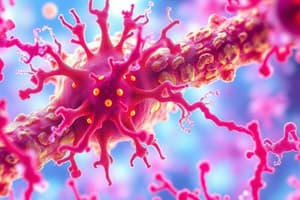Podcast
Questions and Answers
According to the passage, which of the following would be considered a 'host factor'?
According to the passage, which of the following would be considered a 'host factor'?
- The time period
- The patient (correct)
- The agent or microorganism
- The environment or place
Which of the following is NOT one of the objectives of epidemiology mentioned in the passage?
Which of the following is NOT one of the objectives of epidemiology mentioned in the passage?
- To identify the etiology or cause of the disease
- To study the progression of a disease
- To determine the extent of the disease
- To develop a cure for the disease (correct)
What is the primary definition of a pandemic according to the passage?
What is the primary definition of a pandemic according to the passage?
- A disease that is occurring worldwide
- A disease that is occurring in epidemic proportions in many countries simultaneously (correct)
- A disease that is occurring in epidemic proportions in a single country
- A disease that is occurring in a single country
Which of the following is NOT considered a 'host factor' according to the passage?
Which of the following is NOT considered a 'host factor' according to the passage?
What is the primary difference between a 'carrier' and a 'contact' according to the passage?
What is the primary difference between a 'carrier' and a 'contact' according to the passage?
What is the primary difference between a 'patient' and a 'suspect' according to the passage?
What is the primary difference between a 'patient' and a 'suspect' according to the passage?
Which term refers to a disease that is widespread within a population or a geographic location?
Which term refers to a disease that is widespread within a population or a geographic location?
Which of the following statements is true about epidemic diseases?
Which of the following statements is true about epidemic diseases?
What is a vector?
What is a vector?
What is the cause of malaria?
What is the cause of malaria?
Which of the following is the cause or causes of a disease and/or condition?
Which of the following is the cause or causes of a disease and/or condition?
Why should nurses study epidemiology?
Why should nurses study epidemiology?
What does frequency refer to in epidemiology?
What does frequency refer to in epidemiology?
Which term refers to the occurrence of health events by time, place, and people?
Which term refers to the occurrence of health events by time, place, and people?
What is the focus of an epidemiologist according to the text?
What is the focus of an epidemiologist according to the text?
Which term describes diseases that are easily transmitted from one person to another?
Which term describes diseases that are easily transmitted from one person to another?
Why do epidemiologists study 'what pathogen is causing the infection'?
Why do epidemiologists study 'what pathogen is causing the infection'?
In epidemiology, what do terms like 'incidence rate' and 'mortality rate' specifically refer to?
In epidemiology, what do terms like 'incidence rate' and 'mortality rate' specifically refer to?
What is the primary focus of the field of immunology?
What is the primary focus of the field of immunology?
Which of the following scientists is known as the 'Father of Microbiology'?
Which of the following scientists is known as the 'Father of Microbiology'?
What is the process developed by Louis Pasteur that is used to kill harmful microorganisms in food and beverages?
What is the process developed by Louis Pasteur that is used to kill harmful microorganisms in food and beverages?
Which scientist is credited with the development of 'aseptic surgery'?
Which scientist is credited with the development of 'aseptic surgery'?
Which of the following statements about the importance of microbiology is NOT true?
Which of the following statements about the importance of microbiology is NOT true?
Which scientist discovered the antibiotic penicillin?
Which scientist discovered the antibiotic penicillin?
Which of the following is NOT a non-pathogenic microorganism?
Which of the following is NOT a non-pathogenic microorganism?
What is the primary function of non-pathogenic bacteria in the human body?
What is the primary function of non-pathogenic bacteria in the human body?
Which of the following is NOT a function of the normal flora in the human body?
Which of the following is NOT a function of the normal flora in the human body?
Which of the following is an example of a resident flora in the human body?
Which of the following is an example of a resident flora in the human body?
What is the primary mechanism by which normal flora prevents pathogenic microorganisms from attacking tissues?
What is the primary mechanism by which normal flora prevents pathogenic microorganisms from attacking tissues?
Which of the following statements about non-pathogenic microorganisms is NOT true?
Which of the following statements about non-pathogenic microorganisms is NOT true?
Flashcards are hidden until you start studying




